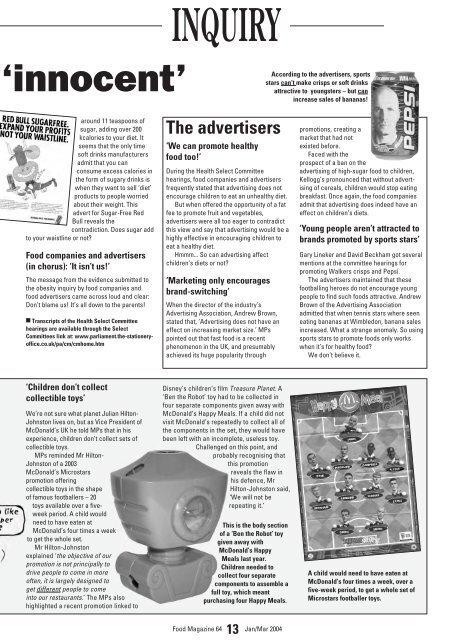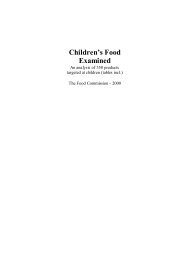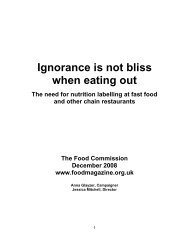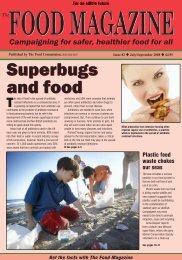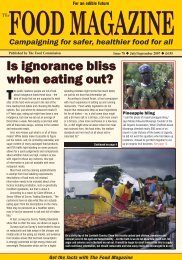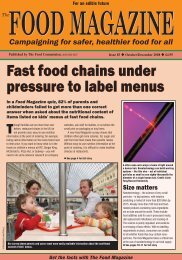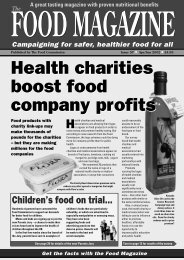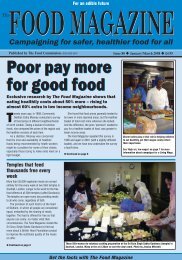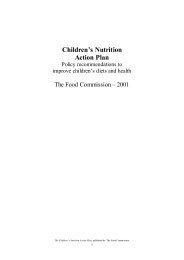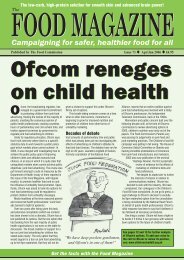Soft drinks - The Food Commission
Soft drinks - The Food Commission
Soft drinks - The Food Commission
- No tags were found...
Create successful ePaper yourself
Turn your PDF publications into a flip-book with our unique Google optimized e-Paper software.
INQUIRY‘innocent’According to the advertisers, sportsstars can’t make crisps or soft <strong>drinks</strong>attractive to youngsters – but canincrease sales of bananas!around 11 teaspoons ofsugar, adding over 200kcalories to your diet. Itseems that the only timesoft <strong>drinks</strong> manufacturersadmit that you canconsume excess calories inthe form of sugary <strong>drinks</strong> iswhen they want to sell ‘diet’products to people worriedabout their weight. Thisadvert for Sugar-Free RedBull reveals thecontradiction. Does sugar addto your waistline or not?<strong>Food</strong> companies and advertisers(in chorus): ‘It isn’t us!’<strong>The</strong> message from the evidence submitted tothe obesity inquiry by food companies andfood advertisers came across loud and clear:Don’t blame us! It’s all down to the parents!■ Transcripts of the Health Select Committeehearings are available through the SelectCommittees link at: www.parliament.the-stationeryoffice.co.uk/pa/cm/cmhome.htm<strong>The</strong> advertisers‘We can promote healthyfood too!’During the Health Select Committeehearings, food companies and advertisersfrequently stated that advertising does notencourage children to eat an unhealthy diet.But when offered the opportunity of a fatfee to promote fruit and vegetables,advertisers were all too eager to contradictthis view and say that advertising would be ahighly effective in encouraging children toeat a healthy diet.Hmmm... So can advertising affectchildren’s diets or not?‘Marketing only encouragesbrand-switching’When the director of the industry’sAdvertising Association, Andrew Brown,stated that, ‘Advertising does not have aneffect on increasing market size.’ MPspointed out that fast food is a recentphenomenon in the UK, and presumablyachieved its huge popularity throughpromotions, creating amarket that had notexisted before.Faced with theprospect of a ban on theadvertising of high-sugar food to children,Kellogg’s pronounced that without advertisingof cereals, children would stop eatingbreakfast. Once again, the food companiesadmit that advertising does indeed have aneffect on children’s diets.‘Young people aren’t attracted tobrands promoted by sports stars’Gary Lineker and David Beckham got severalmentions at the committee hearings forpromoting Walkers crisps and Pepsi.<strong>The</strong> advertisers maintained that thesefootballing heroes do not encourage youngpeople to find such foods attractive. AndrewBrown of the Advertising Associationadmitted that when tennis stars where seeneating bananas at Wimbledon, banana salesincreased. What a strange anomaly. So usingsports stars to promote foods only workswhen it’s for healthy food?We don’t believe it.‘Children don’t collectcollectible toys’We’re not sure what planet Julian Hilton-Johnston lives on, but as Vice President ofMcDonald’s UK he told MPs that in hisexperience, children don’t collect sets ofcollectible toys.MPs reminded Mr Hilton-Johnston of a 2003McDonald’s Microstarspromotion offeringcollectible toys in the shapeof famous footballers – 20toys available over a fiveweekperiod. A child wouldneed to have eaten atMcDonald’s four times a weekto get the whole set.Mr Hilton-Johnstonexplained ‘the objective of ourpromotion is not principally todrive people to come in moreoften, it is largely designed toget different people to comeinto our restaurants.’ <strong>The</strong> MPs alsohighlighted a recent promotion linked toDisney’s children’s film Treasure Planet. A‘Ben the Robot’ toy had to be collected infour separate components given away withMcDonald’s Happy Meals. If a child did notvisit McDonald’s repeatedly to collect all ofthe components in the set, they would havebeen left with an incomplete, useless toy.Challenged on this point, andprobably recognising thatthis promotionreveals the flaw inhis defence, MrHilton-Johnston said,‘We will not berepeating it.’This is the body sectionof a ‘Ben the Robot’ toygiven away withMcDonald’s HappyMeals last year.Children needed tocollect four separatecomponents to assemble afull toy, which meantpurchasing four Happy Meals.A child would need to have eaten atMcDonald’s four times a week, over afive-week period, to get a whole set ofMicrostars footballer toys.<strong>Food</strong> Magazine 64 13 Jan/Mar 2004


